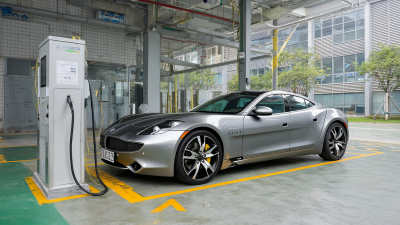
Wall Mounting EV Charge Station
Embracing Innovation: The Future of EV Charger Stations for Sustainable Transportation
As the world increasingly turns its focus toward sustainable transportation, the evolution of EV Charger Stations is becoming more crucial than ever. According to a report by the International Energy Agency, the number of electric vehicles on the road is expected to surpass 230 million by 2030, driving an exponential demand for reliable and efficient charging infrastructure. Furthermore, a recent market analysis indicates that the global EV charging station market could reach $45 billion by 2025, growing at a compound annual growth rate (CAGR) of over 30%. Embracing innovation in EV Charger Stations is not just a trend but a necessity to accommodate this rapid growth and promote a greener future. In this blog, we explore emerging technologies and best practices that are shaping the future of EV charging, ensuring a seamless transition to electric mobility for consumers and businesses alike.

The Rise of Smart Charging Solutions: Revolutionizing EV Station Technology
The rise of smart charging solutions is reshaping the landscape of electric vehicle (EV) infrastructure, bringing a wave of innovation and efficiency to the fore. As the demand for electric vehicles continues to surge, traditional charging stations are evolving to accommodate the unique needs of modern drivers. Smart chargers are equipped with advanced technologies that enable real-time monitoring, integration with renewable energy sources, and dynamic pricing models. This allows users to optimize their charging habits according to energy availability and cost, making EV ownership more economical and environmentally friendly.
Furthermore, smart charging solutions are paving the way for a more connected and reliable network of EV stations. With features such as mobile app integration, users can easily locate available charging points, reserve them in advance, and receive notifications regarding charging status. Additionally, vehicle-to-grid (V2G) technology is emerging, which allows EVs to act as energy storage units that can feed power back into the grid during peak demand times. This not only maximizes the efficiency of energy consumption but also facilitates greater sustainability in transportation, transforming the conventional perception of EV charging into a seamless, intelligent experience that supports a greener future.

Integrating Renewable Energy: How Solar Power is Transforming Charging Stations
The integration of renewable energy, particularly solar power, is revolutionizing the way we think about electric vehicle (EV) charging stations. As the demand for sustainable transportation rises, charging stations are increasingly being designed to harness solar energy, allowing them to operate independently from the traditional grid. This not only reduces the carbon footprint associated with electricity generation but also enhances the resilience of the charging infrastructure. By utilizing solar panels, these stations can generate clean energy on-site, providing a more environmentally friendly solution for EV owners.
Moreover, solar-powered charging stations can significantly lower operational costs. They not only reduce the reliance on grid electricity during peak hours but also allow station operators to capitalize on potential government incentives for renewable energy usage. By adopting this model, businesses and municipalities can contribute to a cleaner planet while potentially saving on energy costs in the long run. With advancements in battery storage technology, surplus energy generated during sunny periods can be stored and used even when the sun isn’t shining, ensuring that EV drivers always have access to sustainable charging options. This synergy between solar energy and EV charging marks an exciting step towards a greener future in transportation.
The Role of Wireless Charging: Enhancing Convenience for Electric Vehicle Users
Wireless charging technology is set to revolutionize the electric vehicle (EV) landscape, making it more convenient for users while supporting a shift towards sustainable transportation. Unlike traditional charging stations that require physical connections, wireless chargers utilize electromagnetic fields to transfer energy from a charging pad to the vehicle. This innovation not only eliminates the hassle of plugging and unplugging cables but also encourages more frequent charging, as drivers can simply park over a charging pad and walk away without any fuss.

As urban areas evolve and the demand for EVs increases, wireless charging stations can be seamlessly integrated into existing infrastructures, such as parking lots and streetlamps. This approach not only maximizes space efficiency but also enhances the aesthetic appeal of urban environments. Additionally, the ability to charge vehicles wirelessly opens up opportunities for public transportation systems, allowing electric buses and taxis to charge while in operation, further promoting the adoption of clean energy solutions. By enhancing convenience and accessibility, wireless charging will play a crucial role in the future of EV infrastructure, making sustainable transportation an effortless choice for all.
Real-Time Data and Analytics: Optimizing the EV Charging Experience
The future of electric vehicle (EV) charging stations is being transformed by the integration of real-time data and analytics, significantly enhancing the EV charging experience. According to a report by the International Energy Agency (IEA), the number of EVs on the road is expected to soar to 145 million by 2030, necessitating a robust and efficient charging infrastructure.
By leveraging real-time data analytics, station operators can monitor usage patterns, peak charging hours, and customer preferences, allowing them to optimize the availability and performance of charging stations.
Furthermore, data-driven insights enable better energy management. The U.S. Department of Energy found that managing charging station load can reduce costs by up to 30%. Implementing smart algorithms can help balance the grid load, distribute energy more efficiently, and predict demand based on trends. With features such as dynamic pricing and predictive maintenance, charging experiences are tailored to the user needs while minimizing downtime. This innovative approach not only enhances user satisfaction but also supports a more sustainable energy ecosystem as EV adoption continues to rise.
Innovative Business Models: The Future of EV Charging Station Ownership and Operations
The electric vehicle (EV) charging landscape is undergoing a profound transformation, driven by innovative business models that redefine ownership and operational structures. Traditional models that relied heavily on public funding are being challenged by private sector initiatives, collaborative partnerships, and subscription services. These new approaches not only enhance accessibility for EV users but also streamline the deployment of charging infrastructure, making it economically viable for businesses to invest in their own charging stations.
One notable model gaining traction is the installation of charging stations as a service, wherein companies can lease equipment and services instead of making substantial upfront investments. This mitigates financial risk and allows businesses to offer EV charging as an added convenience for customers and employees. Additionally, revenue-sharing agreements between property owners and charging network providers are becoming increasingly popular, incentivizing wider participation and driving the growth of charging networks across urban and rural areas alike. As these innovative models evolve, they are set to play a crucial role in promoting sustainable transportation and facilitating the global shift towards electric mobility.
Embracing Innovation: The Future of EV Charger Stations
This bar chart illustrates the growth in the number of EV charging stations globally from 2018 to 2022, highlighting the increasing adoption of electric vehicles and the evolution of innovative business models in charging infrastructure.
Related Posts
-

2025 Trends Revealed 7 Key Innovations in Best Ev Charger Technology
-

Innovative Approaches for Efficient Home Wall Ev Charge Station Installation
-

Noteworthy Variants of AC EV Charging Cables You Should Consider
-

Ultimate Guide to Choosing the Best Ev Fast Charge Station for Your Business
-

5 Reasons Why Ac Ev Chargers Are the Future of Sustainable Transportation
-

The Complete Guide to Choosing the Best V2L Adapter for Your Needs

